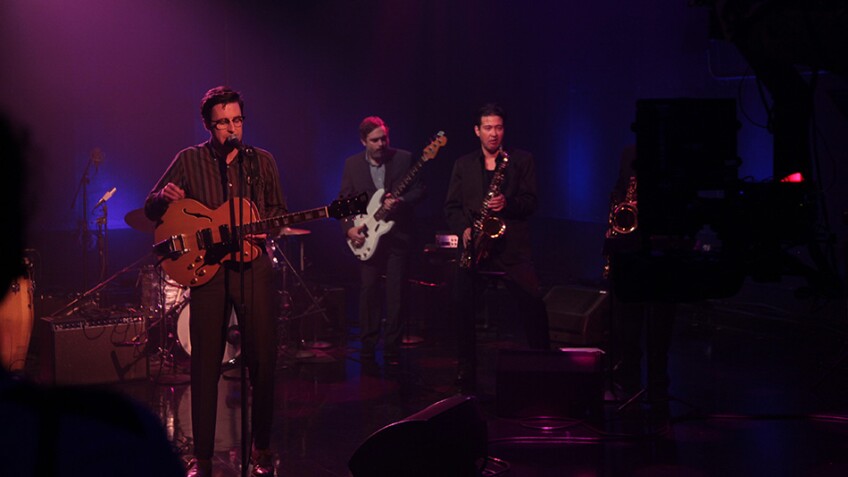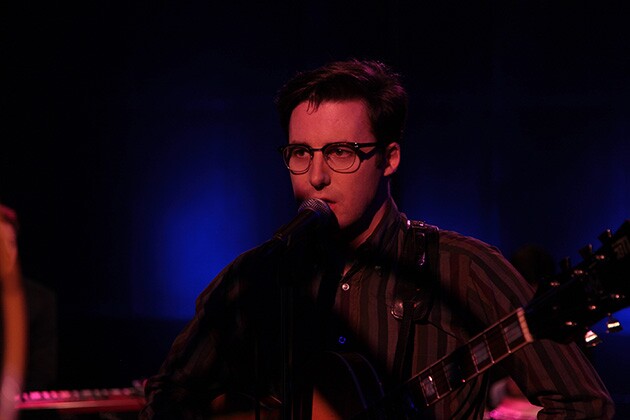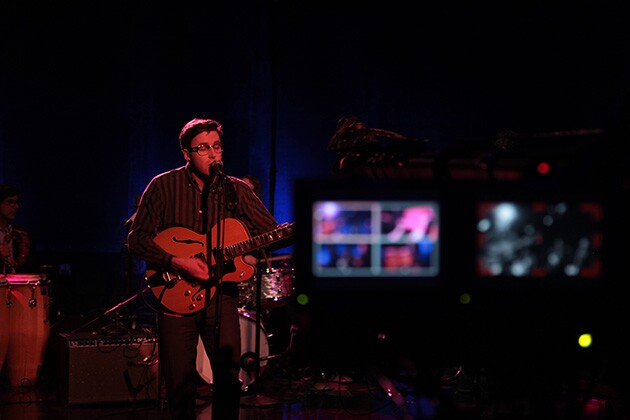
Nick Waterhouse's Old Soul
Musician Nick Waterhouse can recall a time in middle school when music became the means by which kids identified themselves. "I felt pressured to be involved, based on my personality, with a group of people that were into one sound," he tells Studio A. But, Waterhouse didn't identify with the music that was burning up teenage playlists at the time. "I started to seek something that was really true to me," he explains. He gravitated towards music like Them's song "Here Comes the Night," with a tempo that speeds up and slows down throughout the song and Van Morrison's scratchy-throated vocals.
"Just the power and the energy of that stuff seemed a lot more pure and visceral than punk rock or gangster rap or whatever little kids are listening to try to shock their parents," he says.
The music that dominated radio in the late 1990s and early 2000s didn't make as much of an impact on young Waterhouse as older styles did. "I was really interested in figuring out what was visceral, what things made me feel kind of funny," he says. British Invasion groups and blues artists did that.
Around this time, Waterhouse picked up guitar and the influence remains a part of his work to this day. The Santa Ana-born, Huntington Beach-raised musician crafts songs that sound slightly out of time. His husky-voiced rock is rooted in the 1960s definition of the genre.

While some might think of Waterhouse as a throwback, or an imitation of artists whose heyday came long before he was born, the musician himself doesn't look at it that way. "The problem is music, and the way that people think about music nowadays, is totally different than most other art forms," he says. "It is like, by nature, everyone presumes imitation as derivative, whereas, in architecture or literature or film, everybody goes through form by looking at other people." However, Waterhouse's influences have helped him cultivate an audience. His music resonated with fans of northern soul, rare 1960s records that later gained a following in the U.K. He also gained a following amongst Tumblr users after some press spread wide through the social network.
Waterhouse was based in San Francisco when he made his debut album, "Time's All Gone," but the full-length was actually recorded in Costa Mesa. He says that the album represents his feelings at the time that there was "no divide" between the northern and southern regions of California. "It was no big deal for me to move between those two cities," he says. He crafted the songs in San Francisco, but headed south when he needed to record. The album was recorded over three quick sessions. He self-financed what he could, but signed a label deal when the cash ran low.
About a year later, his situation changed. After taking off time to play shows, he lost his job. He went through a break up and San Francisco itself was changing. The tech scene dominated the town, prices were going up and a lot of his local hangouts were closing. Waterhouse moved to Los Angeles.
Now, Waterhouse sees "Time's All Gone" as his "San Francisco record," reflective of his life in that city. By the time he settled into the follow-up album, "Holly," he was in L.A. He says that his second album has less to do with his own life and more about what he saw in his new city. "I wanted to talk about a certain kind of person that I was encountering around Echo Park and Highland Park," he says.

He adds, "I found the more I was assembling the record, the more sense it was starting to make in that it was turning into a Los Angeles record."
On the title track, Waterhouse touches on issues of gentrification. "I was spending time around 'gentrifiers,' for lack of better terms," he says. He noticed how his on generation approached various newly-hip neighborhoods in the city-- "How people almost like the danger of it," he says. "It's fun for them or it gives them credibility or it's exciting." The song, he adds might touch on "disconnect and lack of responsibility."
The song itself is a mishmash of influences-- piano pop melodies, rock vocals, Latin funk rhythm and horns, big soul backing vocals. The lyrics point to observers who witness the pitfalls of city life-- like drunk drivers and shootings-- while acting as those this doesn't affect them. "I don't know why I liked that notion so much," Waterhouse says, "but it just made sense to me."










